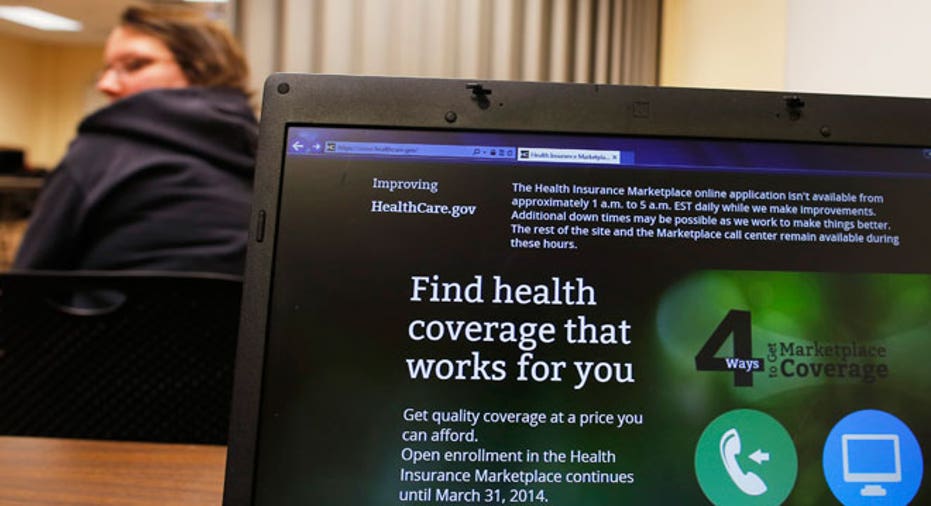Insurance Companies Could Get Pinched With Latest ObamaCare Delay

The latest deadline delay for the Affordable Care Act could lead to even more enrollment problems and place a bigger burden on insurance companies, experts say.
The Department of Health and Human Services announced Thursday it would require insurance companies to accept premium payments for plans that start on Jan. 1 up until Dec. 31-eight days from the already once delayed date of Dec. 23.
“This will kill insurance companies,” says Devon Herrick, senior analyst at the National Center for Policy Analysis, of the latest deadline extension. “I don’t think insurance companies will be there on New Year’s Day figuring out what they owe, who they need to bill and who has legitimate coverage. You can see what a mess this is—I can’t imagine insurance companies can solve this in one day, especially when that day is a holiday.”
This week’s announcement operates under the assumption that enrolling people in insurance plans is simple, adds Tom Harte, president of the National Association of Health Underwriters.
“Is this possible? Yes. But is it practical? No. The challenge here is that the U.S. government is saying the transaction that happens to enroll someone is fundamentally easy, when it is fundamentally complicated.”
While auto insurance companies can seemingly enroll individuals within a few hours, the health-care enrollment process is much more cumbersome, says Larry Kocot, visiting fellow at the Brookings Institution. He says the new legislation has complicated an already-difficult industry to navigate.
“With auto insurance, you are insuring against an event that would cause damage. With health insurance, you are insuring the cost of the utilization of health care, which is inherently more expensive. We have never had the government running the individual or small group market, and the government has established rules that may not be the most friendly to the industry.”
And many in the industry have had enough, says Harte.
“For the past three years, insurance companies have been building internal systems to accommodate the government with health-care reform,” he says. “Now they are being expected to rebuild new systems to accommodate the rush fire management that is being imposed by recent changes from regulators.”
America’s Health Insurance Plans (AHIP) President and CEO Karen Ignagni says continued changes to health-care reform’s original framework may “exacerbate challenges associated with helping consumers through the enrollment process.”
“Health plans will continue to do everything they can to protect consumers from potential coverage disruptions caused by the ongoing technical problems with healthcare.gov,” Ignagni says.
That being said, Kocot says insurance companies have a tremendous incentive to make it work.
“They will do all they can to assist the administration in making this work,” he says. “They won’t have the happiest of holidays, as the applications continue to accelerate and will have to be processed. But, the benefit outweighs the cost.”
This week’s delay is hardly the first to negatively impact insurers since open enrollment kicked off on Oct. 1. In mid-November, after it was clear the president’s promise that anyone who liked their current health insurance could keep it wasn’t true, Obama announced an administrative fix to help restore the pledge. The move allows Americans to keep previously-cancelled plans through 2014 at the discretion of insurers and state regulators.
More than five million plans have reportedly been cancelled since the Affordable Care Act rolled out because they didn’t include essential health benefits required under the new law. Critics of this fix claim it places an undue burned on insurers to communicate to their policyholders whether or not they could have their plans back.
Another hiccup on the federal exchange was announced last week that also brought more bad news to insurers: there is no back-end mechanism for the government to pay insurance companies the costs of customers’ subsidies and cost-sharing plans. Therefore, insurers must bill the government the amount they are estimated to owe, and the government has said it will work quickly to close this payment gap.
Obama had initially touted Healthcare.gov would make shopping for health insurance would be as simple as “buying a T.V. on Amazon” (NASDAQ:AMZN). But that has proved untrue since open enrollment kicked off on Oct. 1. The federal exchange suffered from glitches and error messages during the first two months, leading to the lower-than-projected enrollment numbers. The White House announced Wednesday that a little more than 365,000 Americans having “selected” plans in both state and federal exchanges—which doesn’t necessarily mean they have paid the first premium. The health insurance industry typically considers a person enrolled when they pay their first month’s premium.
Under the ACA, every individual in the country must have coverage by the end of open enrollment period on April 1 or they will face a fine of either $95 a year or 1% of their annual income, whichever is higher.



















